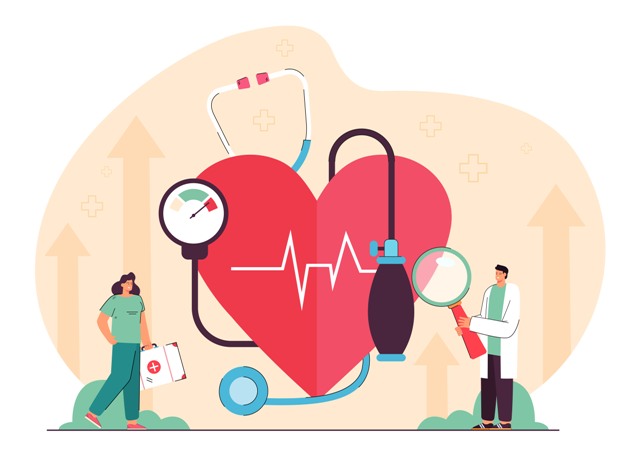Cardiovascular diseases are considered as one of the most vital causes of increasing the rate of morbidity and mortality throughout the world. The diseases or disorders of heart as well as vascular system are collectively known as cardiovascular diseases
Deposition of fats in the blood vessels especially in coronary artery is responsible for developing cardiovascular diseases as it causes narrowing of the lumen of blood vessels, which ultimately increases the prevalence of thrombosis as well as hypertension and leads to atherosclerosis. Narrowing of coronary artery is also responsible for decreasing blood supply to heart as a result the supply of oxygen and nutrients also get reduced to the heart that subsequently damages cardiac muscle and results in myocardial infarction
We should keep our heart healthy as it is considered as one of the most vital organs of our body that helps in blood circulation and makes our life possible
This article will give an overview of the nutritional management that helps us to keep our heart healthy –
Nutritional management
Nutrition is considered as one of the most vital key features for preventing cardiovascular diseases. Proper nutritional support is essential for protecting the heart from further damages and also helps in boosting up the overall cardiac activity
Below points will give an idea of dietary pattern which is required for minimizing the risk of developing cardiovascular diseases
 Energy
Energy
- An individual should consume his or her total calories as per RDA
- While consuming calories it should be kept in mind that obese individual who have cardiac problems should consume 500 kcal less than the normal RDA
- Most of the calories should come from complex carbohydrate
- Proper energy balance should be maintained in order to obtain a healthy body weight because a positive energy balance may lead to obesity which is considered as one of the leading causes of cardiovascular diseases

Carbohydrates
- 60 to 70 percent of calories should come from carbohydrates, especially from complex carbohydrates because complex carbohydrates are packed with fibers, which is considered as one of the most important nutrients that helps in treating cardiac complications
- Fiber plays vital role in reducing the concentration of bad cholesterol or LDL, VLDL and triglycerides in body which help in lowering the prevalence of fat deposition within artery (coronary artery) as a result decreases the risk of developing blockage, atherosclerosis and coronary artery disease in many folds
- On the other hand fiber is also responsible for increasing the level of HDL in body that provides a positive impact to the heart
- It is thus better to consume fiber for keeping the heart healthy and it can be easily done by incorporating complex carbohydrates in diet such as whole grain cereals like wheat, oats, ragi, bajra, brown breads etc.

Proteins
- It is better to consume 1 gm of protein per kg of ideal body weight
- Protein consumption is very much helpful for preventing cardiovascular diseases as it plays vital role in improving the health of cardiac muscle
- Diet should contain enough essential as well as non essential amino acids thus it is better to include plant and animal proteins both in diet
- Arginine, homoarginine and tryptophan are considered as most important amino acids for cardiac health. Their metabolism are considered as main regulators of vascular homeostasis
- Arginine is turned into nitric oxide within body, which acts as an important neurotransmitter that helps blood vessels to relax and thus helps in reducing hypertension, which ultimately minimises the risk of developing cardiovascular diseases because we all know that hypertension is one of the most vital causative factors for cardiac problems. Whereas it is also associated with improving circulation and helps to improve blood flow in coronary artery as well
- Consumption of protein is also very effective for providing a feeling of satiety as it is related with delaying stomach emptying as a result minimises calorie consumption by hindering appetite and facilitates weight reduction, which ultimately provides a positive impact to the heart
- Diet should include nuts, yogurt, turkey, chicken, soyabean, non fat dairy products, chickpeas, lentils, salmon, tuna, herring because they all are good sources of protein and are composed of various important amino acids

Fats
- Fat is considered as one of the most crucial nutrients in the case of cardiac diet. Proper selection of fat with proper proportion is very much important
- The amount of fat consumption should not exceed from 25 percent of total calories
- It is better to focus on the consumption of unsaturated fatty acid especially MUFA and PUFA as they are responsible for improving the HDL level in body which is very beneficial for overall cardiac health. On the other hand they are also accountable for decreasing the concentration of LDL, VLDL and triglyceride which ultimately decreases the risk of developing atherosclerosis, one of the leading causes of cardiovascular disease.
- Diet should contain olive oil, peanut butter, peanut oil, avocados, almonds, season seeds, walnut, corn oil and fatty fish as they all are considered as good sources of unsaturated fatty acid

Vitamins
- All the vitamins should be consumed as per RDA but special consideration should be given to B vitamins
- B vitamins are generally participate in metabolic reactions of the body in the form of coenzyme and thus help to boost up the overall metabolism of the body
- It is thus better to consume B vitamin rich diet in order to ensure a healthy metabolism, which ultimately helps in maintaining a healthy body weight as a result helps to keep cardiovascular diseases at bay

Minerals
- Every minerals should be consumed as per RDA because minerals are essentially required by the body for proper cardiac functioning
- Calcium plays vital role in muscle contraction including cardiac muscle contraction
- Potassium helps in preventing hypertension, which is considered as one of the most vital contributory factors of cardiovascular diseases. Potassium acts as vasodilator that helps in relaxing the blood vessels and also aids in widening the blood vessels as a result promotes smooth blood flow and subsequently reduces elevated blood pressure
- Magnesium helps in maintain healthy heart beat too
Water
- It is better to keep the body hydrated by consuming plenty of water because water helps in flashing out toxins from body as a result helps to clean the body, which ultimately helps in promoting overall wellbeing
- 8 glasses of water should be consumed daily
General consideration
- Diet should contain enough fruits and vegetables as they are loaded with fiber, micronutrients and phytonutrients, all of which are considered as cardio friendly nutrients
- Consumption of refined carbohydrate should be avoided
- It is better to stay away from trans fat and saturated fat
- Fatty fish should be a part of regular diet
- Consumption of fast food, junk food or excessive fried food should be avoided
- It is better to reduce the stress level in order to maintain a healthy heart beat and blood pressure
- It is better to do physical exercise regularly
- Better to say no to smoking and alcohol
- It is better to consume antioxidants as it help in protecting the heart from free radical induced oxidative damages thus help in reducing the risk of developing cardiovascular diseases


Source:
Bonow, R.O. and Eckel, R.H., 2003. Diet, obesity, and cardiovascular risk. New England Journal of Medicine, 348(21), pp.2057-2133.
Kromhout, D., 2001. Diet and cardiovascular diseases. The journal of nutrition, health & aging, 5(3), pp.144-149.
Martínez-González, M.A., Gea, A. and Ruiz-Canela, M., 2019. The Mediterranean diet and cardiovascular health: A critical review. Circulation research, 124(5), pp.779-798.
Reddy, K.S. and Katan, M.B., 2004. Diet, nutrition and the prevention of hypertension and cardiovascular diseases. Public health nutrition, 7(1a), pp.167-186.
Siri-Tarino, P.W. and Krauss, R.M., 2016. Diet, lipids, and cardiovascular disease. Current opinion in lipidology, 27(4), pp.323-328.


